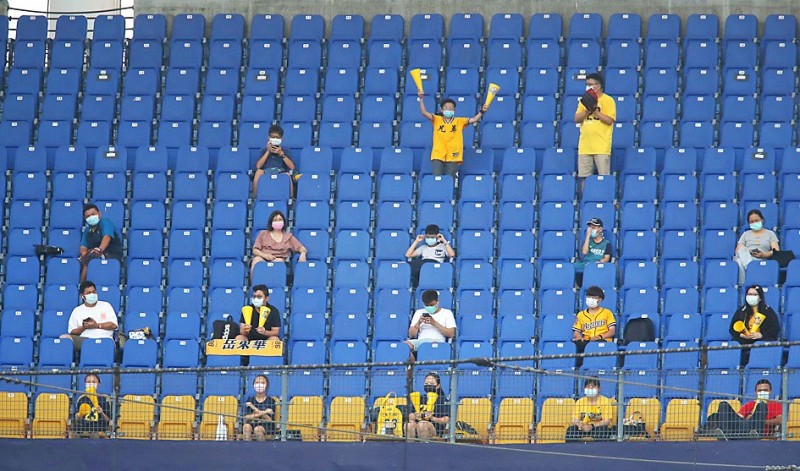《TAIPEI TIMES》 Wait before relaxing rules: academics

Fans practice social distancing at a CPBL game between the CTBC Brothers and Rakuten Monkeys at Taichung Intercontinental Baseball Stadium on Sunday. Photo: CNA
WARNING SIGNS: Local infections surged following the relaxation of social distancing measures in Iran and Hokkaido, NTU College of Public Health vice dean Tony Chen said
By Lee I-chia / Staff reporter
Taiwan should observe its COVID-19 situation for at least another week before considering relaxing social distancing measures, public health experts at National Taiwan University (NTU) said yesterday.
As the number of confirmed cases has reached nearly 4.2 million globally, the average mortality rate has been falling, while the average recovery rate has been increasing slightly, suggesting that the pandemic is slowing down, NTU College of Public Health vice dean Tony Chen (陳秀熙) said in the college’s 14th weekly report on COVID-19.
Governments should not only use the number of daily reported cases when assessing whether to relax lockdown or stay-at-home regulations or social distancing measures, and take other epidemiological indices into consideration, such as cumulative mortality, cumulative incidence and case fatality rates, he said.
Based on the indices, the COVID-19 situation in Taiwan, South Korea and Australia can be considered as having slowed down, while those in the UK and the US continue, and new outbreaks are emerging in Brazil and Russia, he said.
Although the spread of the novel coronavirus seemed to have slowed in Iran and Japan’s Hokkaido, relaxed social distancing measures there led to a resurgence in local infections, so Taiwan should be careful in relaxing restrictions, Chen said.
As about two-thirds of COVID-19 patients in intensive care units experience acute respiratory distress syndrome, of whom up to 42.5 percent might die, patients with serious symptoms have overwhelmed healthcare systems in many countries, he said.
As Taiwan took disease prevention measures early on, made advance preparations to ensure sufficient medical capacity and has relatively few confirmed cases, every COVID-19 patient is being carefully treated in hospitals, but the nation still needs to evaluate its overall critical care capacity when considering relaxing disease prevention regulations, Chen said.
Although Taiwan has not reported any domestic cases in nearly a month, it is still better to observe the disease situation for at least another week before considering relaxing social distancing measures, he said.
NTU Institute of Epidemiology and Preventive Medicine director Yang Ming-chin (楊銘欽) said that during the SARS outbreak in 2003, outpatient hospital visits nationwide dropped 22 percent and the number of hospitalized patients fell 30 percent, dealing a serious blow to hospitals’ finances, adding that the COVID-19 outbreak has had a similar effect.
Although the outbreak is not over yet, hospitals should take the opportunity to boost their resilience by making an inventory of their staff and resources, as well as introducing new care models, learning new technologies, setting up standard guidelines and expanding telemedicine, to prepare for the next threat, he said.
新聞來源:TAIPEI TIMES














